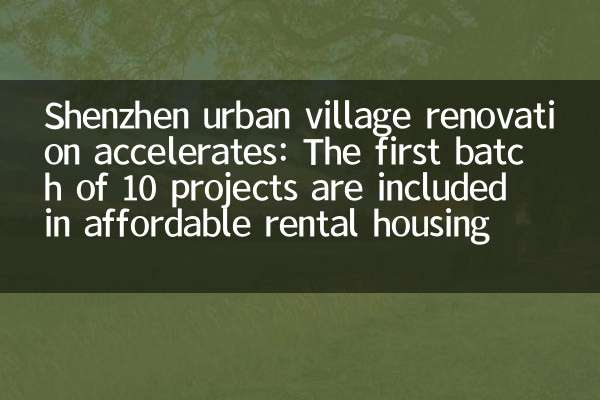Nanjing pilots "Lease-for-purchase": tenants can purchase property rights for 5 consecutive years
Recently, the Nanjing Housing Security and Real Estate Bureau issued an innovative policy, announcing a pilot "rental for purchase" model, allowing tenants to obtain the qualification to prioritize the purchase of the property rights of the rented house after renting a house for five consecutive years. This policy aims to solve the housing problems of new citizens and young people, while revitalizing existing housing sources and promoting the stable and healthy development of the real estate market.
Core content of policy

According to the official documents of Nanjing City, the "rental and purchase" policy mainly includes the following key points:
| project | Specific content |
|---|---|
| Applicable objects | New citizens and young people who have no own housing in Nanjing and have paid social security for 2 consecutive years have passed |
| Rental deadline | The same house must be leased continuously for 5 years |
| Purchase of ownership | After the expiration of the period, you can purchase the property rights of the rented house at the market appraisal price. |
| Pilot scope | The first batch of pilot projects cover five administrative regions including Jianye District, Qinhuai District, Gulou District, etc. |
| Property requirements | The properties included in the pilot must be newly built commercial housing held by developers or institutions. |
Policy background and market reaction
According to data from the National Bureau of Statistics, the national rental population has reached 240 million in 2023, of which more than 60% of young people under the age of 35 account for. In Nanjing, the proportion of rented houses reaches 40% of the permanent population, and the contradiction between supply and demand of housing is prominent.
| City | Percentage of rented population | Average rent (yuan/㎡/month) |
|---|---|---|
| Nanjing | 40% | 45.6 |
| Beijing | 37% | 86.3 |
| Shanghai | 39% | 82.7 |
| Guangzhou | 35% | 63.5 |
Market analysts pointed out that the policy has three major innovations: first, it establishes a "renting and purchasing connection" mechanism, second, it sets up a reasonable transition period, and third, it clarifies the way of price formation. Data from a real estate agency shows that within one week after the policy was released, the number of rental consultations in Nanjing increased by 23% month-on-month, of which 67% of consultants under the age of 30 accounted for.
Potential impact analysis
From the perspective of the real estate market, this policy may have the following impacts:
| Impact dimension | Short-term effect (within 1 year) | Long-term effect (more than 5 years) |
|---|---|---|
| Rental Market | Rents for high-quality properties may rise by 5-8% | The degree of standardization of the rental market is improved |
| House purchase demand | Some urgent needs are converted into rental needs | Form a stable and improved home purchase group |
| House price trends | Limited impact on overall housing prices | Smooth house price fluctuations |
It is worth noting that policy implementation may face three major challenges: one is how to ensure the stability of a 5-year lease, two is how to prevent speculative leasing, and three is the tax and fee issues in the process of property rights conversion. The Nanjing Municipal Housing and Urban-Rural Development Department stated that it will issue supporting implementation rules to ensure the smooth implementation of policies.
Comparison with other urban policies
In recent years, many cities have introduced innovative housing policies:
| City | Policy name | Main features |
|---|---|---|
| Shenzhen | Shared property rights housing | The government and home buyers share ownership in proportion |
| Chengdu | Rent first and then sell | After the lease period expires, part of the purchase price can be deducted |
| Hangzhou | Special talent rental | Offer preferential rentals for specific talents |
In contrast, Nanjing's "rental and purchase" policy emphasizes the continuity of housing stability and property rights conversion, providing tenants with a clearer path to housing upgrades.
Expert opinions and suggestions
Professor Wang, an expert in housing policy research, said: "The Nanjing model organically combines leasing and house purchase, which not only guarantees the basic residence rights of residents, but also provides them with channels for asset accumulation. It is an important exploration of housing system reform." He suggested that policies can be improved in the following aspects in the future:
1. Establish a rent increase control mechanism to prevent landlords from raising prices in disguise
2. Clarify the tax preferential policies for property rights conversion
3. Establish a credit evaluation system to screen tenants who have real housing needs
4. Expand the pilot scope to cover more types of housing
Industry insiders predict that if the pilot achieves significant results, the policy is expected to be promoted to other cities in Jiangsu Province by 2025 and may become an important reference for national housing system reform.

check the details

check the details